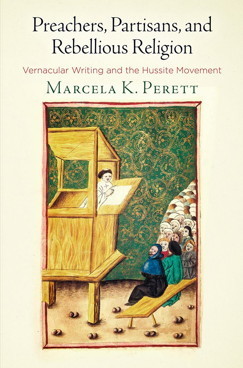New Book by MI Alumna Marcela K. Perett: Preachers, Partisans, and Rebellious Religion: Vernacular Writing and the Hussite Movement

Congratulations to Medieval Institute alumna Marcela K. Perett on her recent book, Preachers, Partisans, and Rebellious Religion: Vernacular Writing and the Hussite Movement, released by the University of Pennsylvania Press in 2018. Perett graduated with a Ph.D. from the University of Notre Dame in 2009, with a dissertation on Jan Hus and the Hussite movement directed by Professor Emeritus of History John Van Engen. Perett is now Assistant Professor in the Department of History, Philosophy, and Religious Studies at North Dakota State University.
From the publisher's website:
"In early fifteenth-century Prague, disagreements about religion came to be shouted in the streets and taught to the laity in the vernacular, giving rise to a new kind of public engagement that would persist into the early modern era and beyond. The reforming followers of Jan Hus brought theological learning to the people through a variety of genres, including songs, poems, tractates, letters, manifestos, and sermons. At the same time, university masters provided the laity with an education that enabled them to discuss contentious issues and arrive at their own conclusions, emphasizing that they held the freedom to make up their own minds about important theological issues. This marketplace of competing religious ideas in the vernacular emerged in Bohemia a full hundred years before the Reformation.
"In Preachers, Partisans, and Rebellious Religion, Marcela K. Perett examines the early phases of the so-called Hussite revolution, between 1412, when Jan Hus first radicalized his followers, and 1436, the year of the agreement at the Council of Basel granting papal permission for the ritual practice of the Utraquist, or moderate Hussite, faction to continue. These were years during which the leaders of competing reform movements needed to garner the laity's support and employed the vernacular for that purpose, translating and simplifying basic theological arguments about the Bible, the church's ritual practice, and authority in the church. Perett illustrates that the vernacular discourse, even if it revolved around the same topics, was nothing like the Latin debates on the issues, often appealing to emotion rather than doctrinal positions. In the end, as Preachers, Partisans, and Rebellious Religion demonstrates, the process of vernacularization increased rather than decreased religious factionalism and radicalism as agreement about theological issues became impossible.
Reviewer Phillip Nelson Haberkern of Boston University remarked, "Marcela K. Perett rightly points out that most scholarship on the Hussite Revolution focuses on the clerical leadership of the movement and its attempts to communicate their political and theological messages to their opponents. Preachers, Partisans, and Rebellious Religion offers a welcome correction and complement by taking seriously how the clerical elite adapted their message through translation into the vernacular in order to persuade the laity to adopt certain positions and behaviors."